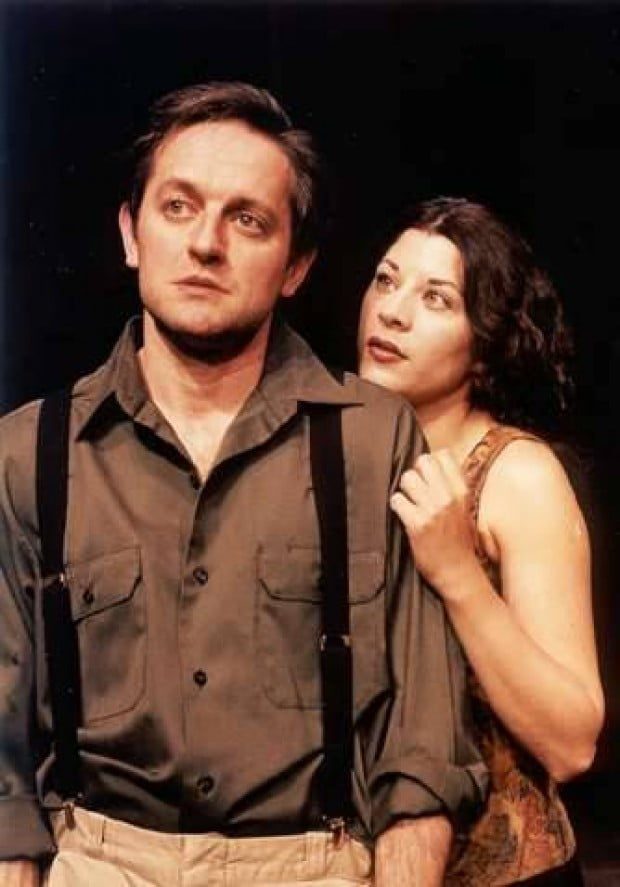Would you believe that a talented New York actress came all the way to Tinsel-town to do a play? In Malibu?
When the Malibu Stage Company puts up Christopher Fry’s “The Lady’s Not For Burning” on July 13 we’ll witness that anomaly.
Camillia Sanes–a girl from Philadelphia; a classically trained actress recently moved from Broadway–will play the woman accused of witchcraft in the ambitious free-verse production. Sanes has a hard time believing the phenomenon herself.
“You think: Girl comes to Hollywood for the big screen. Right?” queries Sanes. “You don’t think classical theater. You don’t think Malibu.”
Drinking coffee, overlooking Zuma Beach, she is quick to add, “But how great is this?”
There is something very disjointing about Sanes right off–she has an honesty that seems frighteningly anachronistic in this city. She continually shrugs it off, saying, “I’m just pathetically idealistic, I guess.”
And she may be a mix of contrasting elements herself–the grit and strength of a New York stage actress and the girl-come-west-to-become-a-star idealism. But after talking about “the hometown cheerleader” (possibly her polar opposite) who moves to Hollywood, she manages to say, “We act to express humanity–we try to enlighten the human condition,” without a lick of pretense.
She can avoid the ugly underbelly of the industry–the gruesome failures, the Black Dahlia-like careers–with a determined version of free will and Karmic justice.
“I really, really think that if you just do your best–in every situation, relationships, work, etc.–you will get what you want,” says Sanes.
She’s got bright powerful green eyes that boast of her energy and confidence–all qualities that leap off the stage. And the East Coast ruggedness–the slang, the accent, and the volume of her voice–tricks you into casting her as some hard-ass rough type. When, in reality, she is the dreamy idealist “going for that connection with the audience, with life.”
The actress, who has only been on the West Coast for three months, is still trying to find that connection with, and settle into, Los Angeles. She is continually getting lost, “even with that Thomas Guide.”
Her tough-nails roots come through and she asks, in a Seinfeldian tone, “What’s this deal out here, when anyone walks into a restaurant and every head in the place snaps around to check them out?” in response to Hollywood’s attention on the external.
Observing on another search for connection in an extremely Los Angeles absurdity, she ponders, “What’s up with dating out here? How do you date? More people are trying to pick me up from cars than I would have believed.”
Sanes started in the direction of performing at a young age and committed to the art very early on. She studied rigorously in high school and was accepted at the University of the Arts (a conservatory) for her undergraduate studies. Then came the graduate school at Yale–the most celebrated “boot camp” for female actresses in the world (from Meryl Streep to Frances McDormand to Claire Danes).
“After all the school I’ve done, if I were a doctor I would be happily secure and making a lot of money,” jokes Sanes. “Instead, I got my degree and said, weeelllll.”
Her manager begged her to come west–to leave behind the independent film, television and theater she was used to doing.
To pursue fame and riches?
“Yeah, yeah,” she admits. “I guess, deep down, somewhere, we–all of us doing this thing–want that in the end. People out here always ask me, ‘Well what is your dream?’ I’m living my dream. I’m doing things I’m really proud of and I have fun.”
She smiles, saying that everyone has told her that, while performing in Malibu, “Maybe Steven will see you and … “
“But, you know what?” she asks. “That’s all well and good, but if someone comes up to me after this show and tells me that they have been in this situation or felt this certain way about Love or Life or Death, that would be the greatest thing for me. I didn’t take this role just to get that important person. I’m trying to affect anybody.”
Charles Marowitz, the director of the play, thinks that reaction is more than possible. Marveling at Sanes’ talents, he says, “She is a truly committed professional. Where most actresses would glide through a role, she is continually investigating and probing.
“I was almost at the point of abandoning the project,” Marowitz continues. “I had seen maybe seventy-five actresses. Then Camillia came and really had the serenity and technical grasp demanded by the play.”
And the play, which was written for legendary actor John Gielgud and launched Richard Burton, is very difficult for actors, “maybe tougher than Shakespeare,” according to Marowitz, because of the free-verse, the open rhythms.
“It’s hard. It’s hard to make it sound easy. But then it’s great and so beautiful,” Sanes says about the verse, maybe reflecting her outlook on everything. She calls the role “a female Hamlet,” and looks at the daunting challenge as a reward.
“I’m stoked, I’m really happy,” she says.


